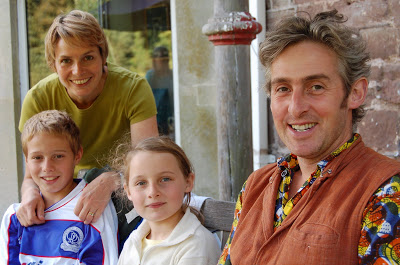
For the last few years we have been planning, together with Mark Cazalet (seen here with his wife Harriet, Felix and Freya), a selection from Hardy’s poems, written in 1912-13 about his wife, Emma.
Here we quote from Claire Tomalin’s recent book Thomas Hardy, The Time-Torn Man, on her view of the importance of this group of poems:

The sequence, which (Thomas Hardy) called “Poems of 1912-13″, adding the words Veteris vestigia flammae (‘traces of old flames’), makes up one of the finest and strangest celebrations of the dead in English poetry. It is cast in a different mould from Lycidas, Adonais or In Memoriam, fragmented, less marmoreal, but it still stands beside them.

. . . In these poems about Emma he is rediscovering repressed sorrow and forgotten love. He is like an archaeologist uncovering objects that have not been seen for many decades, bringing them out into the light, examining them, some small pieces, some curious bones and broken bits, and some shining treasures. There is a rising excitement in the writing as of someone making discoveries. He has found the most perfect subject he has ever had.

Mark Cazalet was very enthusiastic about creating prints ( a combination of wood and linocuts) for our book, Green Blades, to reflect the ‘rediscovery of repressed sorrow and forgotten love’ but it is a long and painstaking task to cut wood and lino for twenty-two large images and the work was achieved alongside huge murals, stained and engraved glass commissions and painting trips to Israel and Palestine for a magnificent series bringing stories from the Bible into the modern world. At last ‘our’ book is on the press and Nicolas has his task of bringing the poems and images together in printings which will involve three colours for each page opening. It will be on characterful Italian white paper, 330x350mm – so large and almost square – and the inks are specially mixed by Cranfield Colours from natural pigments.

The images above are proofs of the blocks taken by the artist – to show Nicolas what they should look like!

See more of Mark Cazalet’s varied and fascinating work here.
